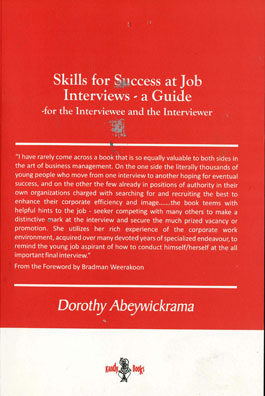A boon to job seekers
‘Skills for Success at
Job Interviews – a Guide for the Interviewee and the Interviewer’
Author: Dorothy Abeywickrama
Publisher: Kandy Books
Reviewed by Eric J. de Silva
It was indeed a great pleasure for me to read the recent publication
‘Skills for Success at Job Interviews – a Guide for the Interviewee and
the Interviewer’ written by Dorothy Abeywickrama, one of our foremost
experts in counselling and career guidance with a number of publications
(some of which are in Sinhala) to her credit.
Written with both the interviewer and the interviewee in mind, the
publication contains a wealth of material encapsulated into its 108
pages which would help not only the interviewee to prepare for and face
a job interview with confidence but also the interviewer and those who
do the preparatory work for the job advertised.
 Part 1 of the book contains four chapters which cover the entire
terrain from preparing the job application to the skills required to
face an interview with confidence. These chapters go well beyond the
run-of-the mill advice that is commonly available to job applicants, and
provide interviewees with very specific and clear guidelines that flow
from the pen of someone who has to her credit a M.Sc. in Counsellor
Education obtained from one of top universities in the USA, enhanced by
decades of experience working as a Personnel Manager in a leading
private sector firm and thereafter as a consultant in Management and
Career Development for several multinational companies. Part 1 of the book contains four chapters which cover the entire
terrain from preparing the job application to the skills required to
face an interview with confidence. These chapters go well beyond the
run-of-the mill advice that is commonly available to job applicants, and
provide interviewees with very specific and clear guidelines that flow
from the pen of someone who has to her credit a M.Sc. in Counsellor
Education obtained from one of top universities in the USA, enhanced by
decades of experience working as a Personnel Manager in a leading
private sector firm and thereafter as a consultant in Management and
Career Development for several multinational companies.
The author highlights the fact that, when writing the book, she had
in mind not only “first entry job seekers” but also “job seekers
covering a wide range of job hunting categories”. It is well-known that
not all the applicants are summoned for interview in certain instances
where applications are called, and the preliminary selection is made on
the basis of the content and quality of the job application.
This makes it absolutely necessary to prepare the application
“methodically and carefully, paying meticulous attention to all details”
to quote her words, and a detailed set of instructions as to how to get
about the task is provided.
Instructions
Similarly, a very useful set of instructions is provided in regard to
the matters that should receive the attention of the interviewee during
the period preceding a job interview which make me echo the words of
Bradman Weerakoon, my senior colleague in the Ceylon Civil Service (and
later the S.L.A.S.), who has said as follows in the foreword he has
written to Dorothy's book: “I could not help thinking how useful this
very practical advice would have been in my own amateur attempts at
facing interview boards in some distant past.” The interview itself gets
very detailed attention of a type that only an expert who has given her
attention to the minutest detail of what should actually happen at a job
interview from the point of view of making the best selection possible
is capable of giving, as against what often happens in practice. It is
here that the interviewers’ role becomes important, and the author deals
with this aspect with characteristic dexterity in the two chapters
contained in Part 11 of her book.
The author says in plain and simple language that “poor job selection
is invariably the result of poor-quality interviewing conducted without
much preparation and has therefore been based on hunches and on instinct
rather than by a process of a thorough assessment.” Dorothy has devoted
an entire chapter for “Interviewing Skills for the Interviewer” which
should be compulsory reading for those entrusted with the task of
selecting the best for the jobs advertised.
In Part III, she goes beyond the confines of job selection and
proceeds to deal with interviewing skills that are required for what she
calls “other employment settings” and in employee counselling (her field
of specialisation) which requires a totally different set of skills.
This section, I have no doubt, will be of considerable use to training
institutions in both the public and private sectors.
Job application
It must be pointed out that the main focus of Dorothy's publication
(as stated in her Introduction) is on the interviewee reflecting her
life-long interest in developing young people, and she is in no doubt
that even the section dealing with the interviewer would help the
interviewee to “understand and appreciate better the perspective from
which the interviewer (representing the employer) studies the job
application, does the preliminary screening, and thereafter prepares the
short-list of those to be summoned for the interview”.
The publication is amply supported by diagrams, charts and even a
mock interview underlining the author's attention to detail. I have no
hesitation in recommending it as compulsory reading not only by
interviewees and interviewers but also by others interested in raising
the overall efficiency and effectiveness of the organisations they
belong to. It goes without saying that it merits being used as a
handbook in training institutions in both the private and public
sectors.
The writer is a former Secretary, Ministry of Education and UNDP,
UNESCO, ESCAP Consultant) |

